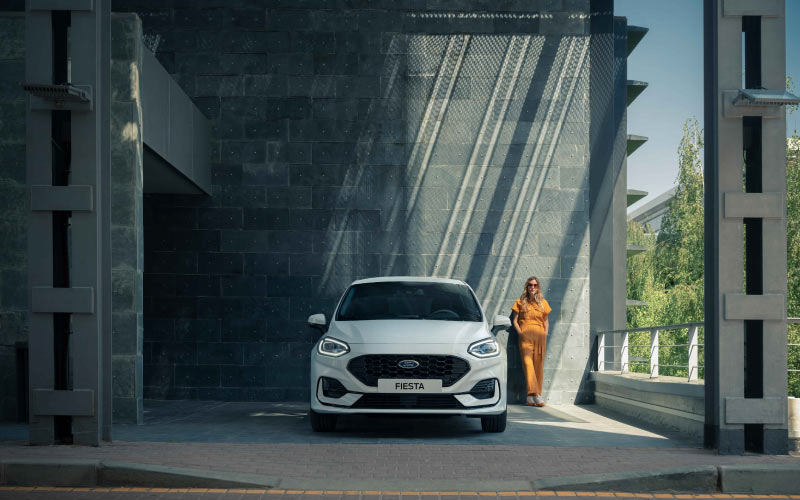Farewell to the Ford Fiesta!
Share

Farewell to the Ford Fiesta!
One of Ford’s most iconic models, the Ford Fiesta, is set to retire from the market, after being one of the nation’s best-loved vehicles for nearly 50 years.
To the surprise of many, Ford recently announced that their Ford Fiesta model will be phased out of the market, despite being the manufacturer’s best-selling model since the launch of the first-generation Fiesta in 1976.
Though we’re sad to see this classic small hatchback go, we’re celebrating its long-standing success by taking a look back at how far this little supermini has come since it all began, rounding up its top memorable moments.
Following the Fiesta’s Journey
1976
This saw the beginning for the early Ford Fiesta, with production taking place in Valencia, Spain. It was originally available with a 1.0-litre and a 1.1-litre engine size.
1979
Just three years after its launch, the Ford Fiesta saw its millionth model made for sale around the world.
1981
After a successful few years, the Fiesta expanded its model offering with the launch of the Fiesta XR2. Upgrades included a 1.6-litre engine, a stiffer suspension, a new alloy wheel design and updated headlights. It was also the first Fiesta capable of achieving 100mph.
1982
Fiesta is officially named best-selling car of its kind in Britain and Germany, a title which it would keep for the next six years.
1983
The next set of upgrades arrived in 1983 with the new Fiesta Mk2. With a choice of 1.0-litre, 1.1-litre, and 1.3-litre engines, the latter saw the addition of a fifth gear. The Fiesta 1.6-litre diesel model was soon introduced featuring an overhead cam and indirect injection engine forming the standard for later Ford models.
1984
A year later, the XR2 MkII Fiesta made its debut with a standard 1.6-litre, single-overhead-cam engine, and 5-speed gearbox, along with uprated suspension and brakes.
1987
In 1987, the Fiesta achieved another impressive milestone with its strongest year for sales, selling 153,000 Fiestas in Britain.
1989
A few years later saw another upgrade to the Fiesta with the Mk3 launch. Updates included anti-lock brakes and lean-burn engines, with a wider body shape and next-level wheelbase. The Mk3 saw the Fiesta become available as a five-door car for the first time, and the first small car to feature the ABS system. It was available in 1.0-litre and 1.1-litre versions, as well as a 1.4-litre option.
The Fiesta Mk3 was soon joined by the Fiesta XR2i which launched with a new 1.6-litre twin cam engine and 5-speed gearbox.
1990
At the Turin Motor Show in 1990, another addition to the Fiesta family was launched – the Fiesta RS Turbo. Combining the XR2i engine with an intercooled Garrett turbocharger, this resulted in a hot hatch that reached 100km/h (60mph) an impressive 1.6 seconds faster than the former model.
1992
In 1992, the Ford brand launched its Fiesta RS 1800 which offered a 16-valve, 1.8-litre engine, five-spoke alloy wheels, a body-colour spoiler, and improved overall handling.
1996
Four years later, the Fiesta started to take on a new shape – quite literally. The Fiesta Mk4 featured a more rounded design for improved aerodynamics, with an oval-shaped grille – a stark contrast to the Fiestas of old.
It was available with 1.25-litre, 1.4-litre and 1.6-litre petrol engines, and a 1.8-litre diesel engine.
1999
Before the turn of the millennium, a ‘new edge’ Fiesta was introduced, with updated engines and a striking new look. The Zetec S model was soon to launch in the new year.
2001
In 2001, the Fiesta Mk6 was launched at the IAA Frankfurt Motor Show, helping the Fiesta to establish its place in the 21st century. Meanwhile, the production of new Fiestas was beginning in Cologne and the Fiesta’s hometown, Valencia.
2002
The following year, the Mk6 was raring to go on sale in the UK, with the five-door version and new engine line from the launch, including a new 1.3-litre Duratec engine, and a 1.6-litre Duratec engine.

2005
In 2005, the first 2.0-litre Fiesta ST came to the market, offering 148bhp – a record holder for the most powerful Fiesta of its time.
2008

Following the new-age Fiesta line-up was the Mk7 which was launched at the Geneva Motor Show. The model soon went into production all over the world in Germany, Spain and China. The model saw the addition of more new, powerful engines.

2012
The Mk7 saw another upgrade in 2012, with a new 1.0-litre EcoBoost engine, which would later become a pioneering standard for the future of Ford’s vehicle offering.
2014
In 2014, the Ford Fiesta celebrated yet another fantastic milestone achievement, becoming the best-selling vehicle ever in the UK after beating the Ford Escort’s some 4,105,961 registrations.

2015
Just one year later, the Fiesta then celebrated its best year in 2015, having sold more than 133,000 models.
2016
In 2016, the Fiesta ST line was introduced, bringing the Fiesta a unique 1.6-litre EcoBoost engine offering 200bhp making it the fastest model. The Fiesta would then continue to hold best-selling status every month for years to come.
2017
The Mk8 was launched in 2017 in the shape of a high-riding crossover available in Vignale and Active trims, with a choice between five petrol and two diesel engines.

Present
Though it remains to this day one of the most successful and best-selling cars in history, the Fiesta’s journey is sadly coming to an end.
Looking for your Ford Fiesta? You can still purchase this iconic, beloved car until June 2023, and we have a wide range available at Bristol Street Motors.
Take a look at our Ford Fiesta deals now, and don’t miss out on the last chance to buy one of the nation’s favourite cars for yourself!
Browse Ford Fiesta deals